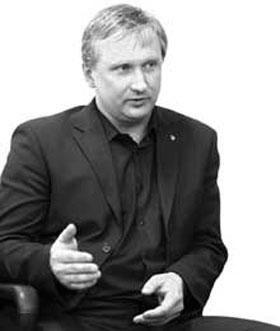Pavel Sapelka: administrative cases against Pushkin were fabricated
On 13 December lawyer
Pavel Sapelka studied the materials of the administrative case of a well-known
artist Ales Pushkin who had been punished with 13 days of arrest on 9 December by
Judge Volha Foma, for ‘hooliganism’ and ‘insubordination to lawful demands of
the police’.
As said by Mr. Sapelka, having studied evidence and the case he has come to the
conclusion that the case had been fabricated with the use of testimonies of two
witnesses. The police didn’t even find the time to make the two testimonies
match. For instance, at first one of the witnesses (Pushkin’s neighbor) told
that he had called to the police after Pushkin had hit him, as a result of
which he had fallen and smashed his nose. However, in this case it would be
necessary to attach the conclusion of the forensic expertise (which is
considerably harder to fabricate). That’s why the ‘witness’ changed his
testimony and sated that the Pushkin started a row and used obscene languages.
’The witnesses (residents of the settlement of Bobr, with previous convictions)
were united only in their wish to make a hooligan out of the artist,’ says Mr. Sapelka.
The lawyer also met with Pushkin’s wife and prepared the cassation appeals against
the court verdicts, which he considers absolutely groundless.
As said by him, the real reason for imprisoning Pushkin is clearly visible in
the case materials.
Mr. Pushkin was punished for committing two offences – ‘disorderly conduct’ and
‘insubordination to lawful demands of the police’. However, the demand of the
policemen to come with them could be considered as lawful only if the fact of
committing the disorderly conduct was proved.
The detention of Mr. Pushkin was conducted with the participation of the whole
administration of the Krupki District Police Department – the head of the inquest
department, the head of the department of maintenance of the public order and
the chief operative of the criminal search department. It seems that there are
no criminals in the Krupki district at all, if all policemen participate in the
detention of an artist who didn’t even resist – he just refused to go with the policemen
– that’s why they had to carry him.
They carried him to the forensic expertise (which confirmed that he hadn’t
consumed alcohol), then they carried him to court (for the trial) and at the end
– to the prison ward where he is serving the arrest.
As far as Mr. Pushkin considers his imprisonment to be unlawful, he has declared
a hunger-strike of protest. According to some information, he also keeps silent
in protest – he refused to speak at the trial and refuses to speak with the
prison guards.


















